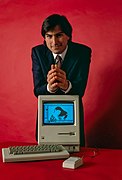Portal:Internet
The Internet PortalThe Internet (or internet) is the global system of interconnected computer networks that uses the Internet protocol suite (TCP/IP) to communicate between networks and devices. It is a network of networks that consists of private, public, academic, business, and government networks of local to global scope, linked by a broad array of electronic, wireless, and optical networking technologies. The Internet carries a vast range of information resources and services, such as the interlinked hypertext documents and applications of the World Wide Web (WWW), electronic mail, telephony, and file sharing. The origins of the Internet date back to research to enable time-sharing of computer resources and the development of packet switching in the 1960s. The set of rules (communication protocols) to enable internetworking on the Internet arose from research and development commissioned in the 1970s by the Defense Advanced Research Projects Agency (DARPA) of the United States Department of Defense in collaboration with universities and researchers across the United States and in the United Kingdom and France. The ARPANET initially served as a backbone for the interconnection of regional academic and military networks in the United States to enable resource sharing. The funding of the National Science Foundation Network as a new backbone in the 1980s, as well as private funding for other commercial extensions, encouraged worldwide participation in the development of new networking technologies and the merger of many networks using DARPA's Internet protocol suite. The linking of commercial networks and enterprises by the early 1990s, as well as the advent of the World Wide Web, marked the beginning of the transition to the modern Internet, and generated a sustained exponential growth as generations of institutional, personal, and mobile computers were connected to the network. Although the Internet was widely used by academia in the 1980s, the subsequent commercialization in the 1990s and beyond incorporated its services and technologies into virtually every aspect of modern life. (Full article...) Selected article
Cyberpunk is a genre of science fiction that focuses on computers or information technology, usually coupled with some degree of breakdown in social order. The plot of cyberpunk writing often centers on a conflict among hackers, artificial intelligences, and mega corporations, tending to be set within a near-future dystopian Earth, rather than the "outer space" locales prevalent at the time of cyberpunk's inception. Much of the genre's "atmosphere" echoes film noir, and written works in the genre often use techniques from detective fiction. While this gritty, hard-hitting style was hailed as revolutionary during cyberpunk's early days, later observers concluded that in terms of literature, most cyberpunk narrative techniques were less innovative than those of the New Wave, twenty years earlier. Primary exponents of the cyberpunk field include William Gibson, Bruce Sterling, John Shirley and Rudy Rucker. The term became widespread in the 1980s and remains current today.
Selected picture A hotspot is a venue that offers Wi-Fi access. The public can use a laptop, WiFi phone, or other suitable portable device to access the Internet. Of the estimated 150 million laptops, 14 million PDAs, and other emerging Wi-Fi devices sold per year for the last few years, most include the Wi-Fi feature. News
Wikinews Internet portal
WikiProjects
Did you know (auto-generated) -
Selected biography
Joseph Carl Robnett Licklider (March 11, 1915 – June 26, 1990), known simply as J.C.R. or "Lick" was an American computer scientist, considered one of the most important figures in computer science and general computing history. After early work in psychoacoustics, he became interested in information technology early in his career. Much like Vannevar Bush, J.C.R. Licklider's contribution to the development of the Internet consists of ideas, not inventions. He foresaw the need for networked computers with easy user interfaces. His ideas foretold of graphical computing, point-and-click interfaces, digital libraries, e-commerce, online banking, and software that would exist on a network and migrate wherever it was needed. Licklider was instrumental in conceiving, funding and managing the research that led to modern personal computers and the Internet. His seminal paper on Man-Computer Symbiosis foreshadowed interactive computing, and he went on to fund early efforts in time-sharing and application development, most notably the work of Douglas Engelbart, who founded the Augmentation Research Center at Stanford Research Institute and created the famous On-Line System. He played a similar role in conceiving of and funding early networking research, most notably the ARPAnet.
General images -The following are images from various internet-related articles on Wikipedia.
Selected quoteMore Did you know...
Main topics
Featured contentCategoriesRelated portalsThings you can do
Associated WikimediaThe following Wikimedia Foundation sister projects provide more on this subject:
Wikipedia's portals |






















































